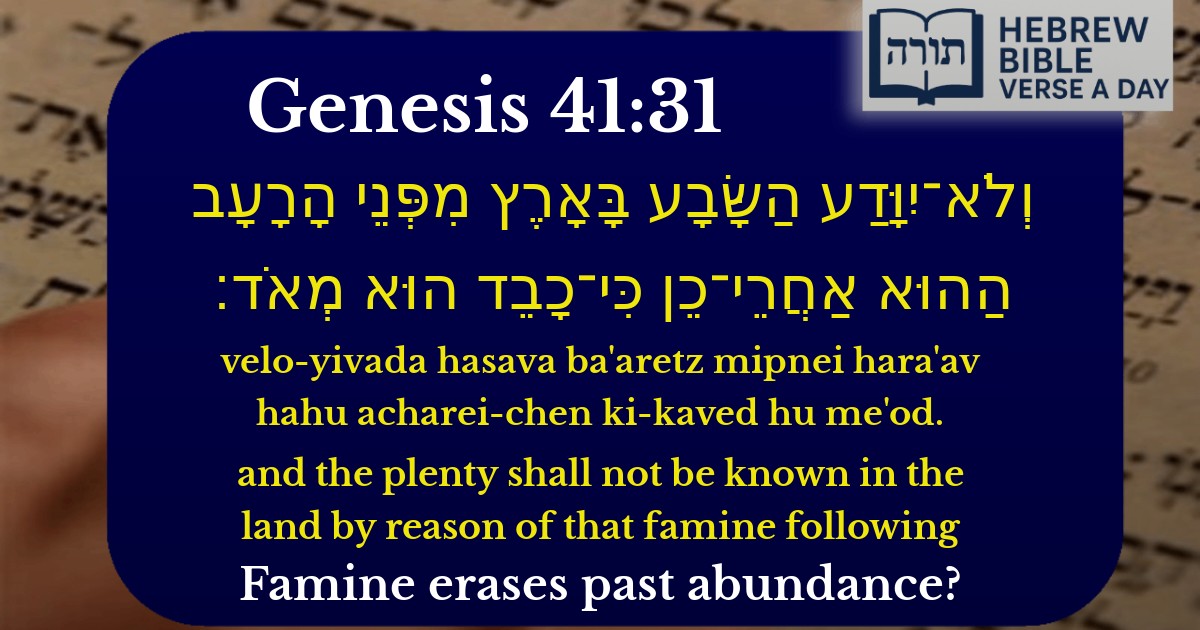Join Our Newsletter To Be Informed When New Videos Are Posted
Join the thousands of fellow Studends who rely on our videos to learn how to read the bible in Hebrew for free!
Hebrew Text
וְלֹא־יִוָּדַע הַשָּׂבָע בָּאָרֶץ מִפְּנֵי הָרָעָב הַהוּא אַחֲרֵי־כֵן כִּי־כָבֵד הוּא מְאֹד׃
English Translation
and the plenty shall not be known in the land by reason of that famine following
Transliteration
Velo-yivada hasava ba'aretz mipnei hara'av hahu acharei-chen ki-kaved hu me'od.
Hebrew Leining Text
וְלֹֽא־יִוָּדַ֤ע הַשָּׂבָע֙ בָּאָ֔רֶץ מִפְּנֵ֛י הָרָעָ֥ב הַה֖וּא אַחֲרֵי־כֵ֑ן כִּֽי־כָבֵ֥ד ה֖וּא מְאֹֽד׃
וְלֹֽא־יִוָּדַ֤ע הַשָּׂבָע֙ בָּאָ֔רֶץ מִפְּנֵ֛י הָרָעָ֥ב הַה֖וּא אַחֲרֵי־כֵ֑ן כִּֽי־כָבֵ֥ד ה֖וּא מְאֹֽד׃
🎵 Listen to leining
Parasha Commentary
📚 Talmud Citations
This verse is not quoted in the Talmud.


Context in the Torah
The verse (Bereshit 41:31) appears in Pharaoh's dream, interpreted by Yosef, describing the severity of the upcoming famine in Egypt. The phrase "וְלֹא־יִוָּדַע הַשָּׂבָע בָּאָרֶץ" ("the plenty shall not be known in the land") emphasizes how the famine will completely overshadow the preceding years of abundance.
Rashi's Explanation
Rashi comments that the famine will be so overwhelming that people will forget the previous years of plenty. Even if someone tries to recall the years of abundance, the intensity of the famine will make it seem as if those years never existed. This interpretation is based on the wording "לֹא־יִוָּדַע" ("shall not be known"), indicating a complete erasure of memory due to the severity of the suffering.
Rambam's Perspective
Rambam (Hilchot Ta'anit 1:1-3) discusses how extreme hardships, such as famine, serve as divine warnings to inspire repentance. The phrase "כִּי־כָבֵד הוּא מְאֹד" ("for it will be very severe") underscores that such events are not random but are intended to awaken people to spiritual reflection and improvement.
Midrashic Insights
Halachic Implications
The Shulchan Aruch (Orach Chaim 576:1) cites this verse as a basis for communal fasting during times of drought or famine, emphasizing that such crises demand urgent prayer and introspection. The phrase "מִפְּנֵי הָרָעָב" ("by reason of that famine") teaches that recognizing the cause of suffering is the first step toward rectification.